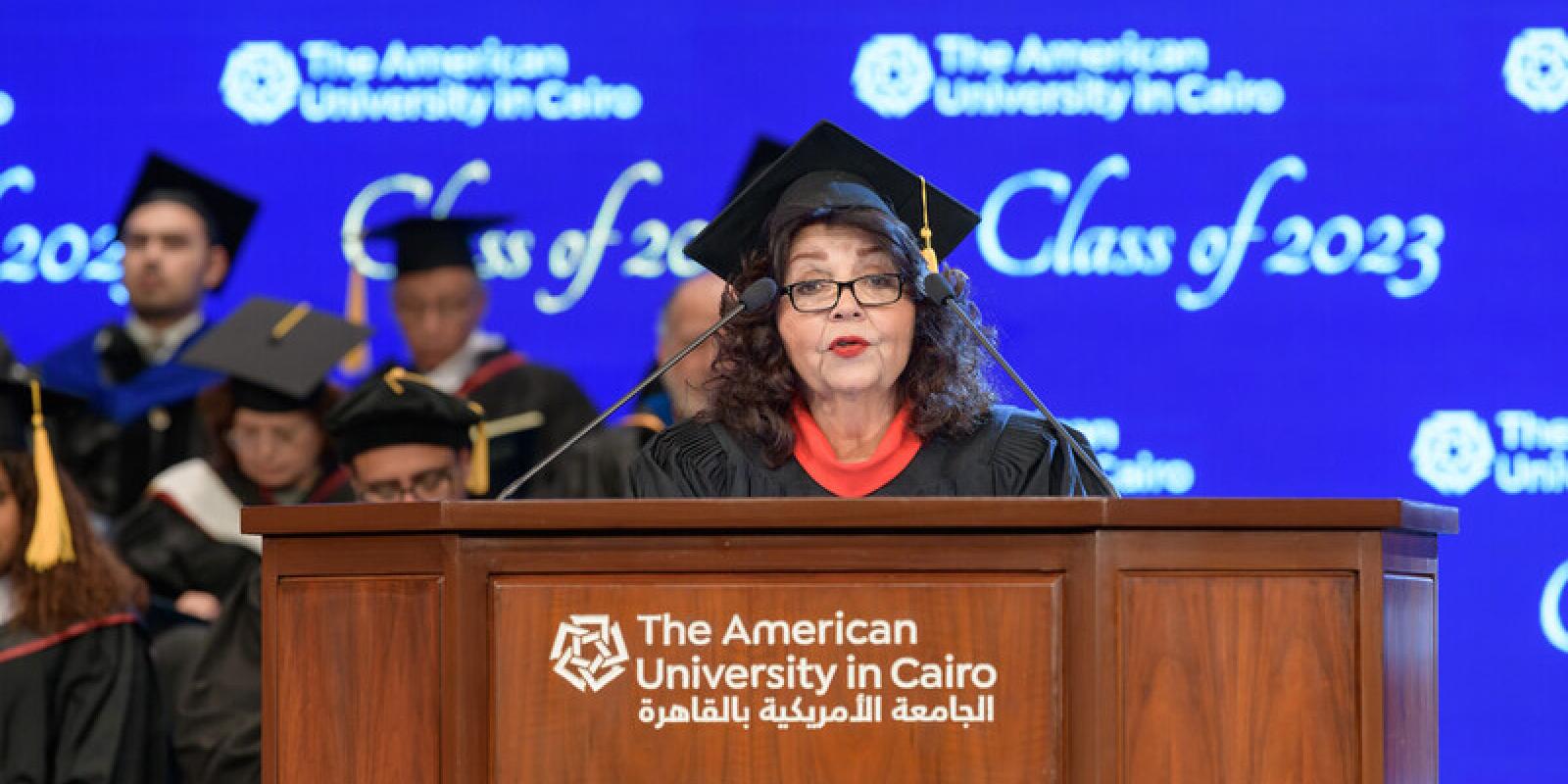
The Importance of Lifelong Learning: 74 Year Old Master's Student Shares Her Story
“I am 74 years old – I know it is strange for a woman to confess her age. Our societies are aging and the concept of age is changing. As humanity begins to live longer, lifelong learning will become vital for societies to re-skill and re-adapt individuals to the times and to new economic needs,” said Kadria Abdel-Motaal (MA ‘23) in a speech she gave as the representative of the graduate class of 2023.
Abdel-Motaal recently graduated from AUC with a master’s in educational leadership. With 74 years of life experience, she agreed to sit down with News@AUC and share her story.
Have you always intended to pursue a master’s degree?
I always wanted to go to medical school, and I was always at the top of my class during the first three years of my bachelor’s degree at Ein Shams University. But at the end of my studies, I got married and had two kids, so I wasn’t at the top of my class as usual. We didn’t have cumulative GPAs at the time — only the last year counted — so I was not allowed to go to postgraduate studies. This left a hole inside myself that I was always determined to fill, one way or another.
What did you do after completing your undergraduate degree?
I first worked as a specialist at the Egyptian National Blood Bank VACSERA, eventually becoming chairwoman and chief executive officer of one of Vacsera’s affiliated companies, the Egyptian Company for Biotech Industries. When I retired from that company at the age of 60, I served as the president of the Heliopolis Academy for Research. We focused on developing and attracting funds for multi-partner research projects. After that, I led the establishment project of Heliopolis University and became the director of its research department.

degree at commencement
Wow, you’ve really kept busy. How did you decide to join AUC?
After I retired from Heliopolis University, I asked myself, “What do I want to do?” And I remembered my big old problem, the hole I’ve been wanting to fill. I knew I had to go to postgraduate studies. So I joined the educational leadership program.
Why educational leadership?
I worked closely within academia during the establishment of Heliopolis University, but I never truly belonged to the field of education. I really wanted the academic background on education, and I thought educational leadership was a beautiful program for that goal.
What did being in the classroom teach you that your practical experience had not?
It introduced me to areas I had never considered before, like the social foundation of education, theories of education and theories of human development. I also learned about the professional way to develop a program, based on pedagogical theories and different delivery methods. I learned how to write in a professional and academic way. It was a well-rounded experience from all sides.
What was it like studying with students who are younger than you?
From day one, I was in the mindset of being a student. I was not the boss or the director, I was just a simple student. So, the other students dealt with me as their colleague, there was no real age barrier. If anything, they injected me with some youth. I was very pleased that there were no complications at all. I was able to meet a group of people that were different from my usual social network, and the majority were women — which is very impressive. It was an enlightening and humbling experience.

the commencement ceremony
What did your family think of your decision to pursue a master’s degree?
They were incredibly supportive; they were really the driving force behind me. They would tell me, “Remember to apply, you’re going to miss the deadline!” or “What did you write for your application, let me see.” Even at graduation, they drove me to the ceremony like I was a child whose parents were taking me to my first day of school. Learning and education is very important in my family.
Why do you think lifelong learning is so important?
Continuous learning is crucial. People are living so long now that they can retire and still have another 20 years of life, yet many spend those years sitting and waiting. There’s a misconception that your life is done after your career. It’s not! Knowledge continues to be discovered, and the things my generation learned 50 years ago are totally different now. We need to continue to educate and recreate ourselves.
What’s next for you?
I have many things I want to do. I hope to join a PhD program and I also want to publish my master’s thesis. My thesis was on expanding the culinary arts higher education in Egypt. Culinary arts is not represented in Egyptian higher education, even though it is a multidisciplinary field that involves different areas of study, such as food biology, food chemistry, history and sociology. This is a major pillar of the tourism industry; you hear people talking about the pyramids when they visit, but not the local cuisine. There are not many Egyptian restaurants abroad and our food is misappropriated into other nationalities’ cuisines. My next step is to use my education and my experience to contribute to filling this gap in higher education.
